 Who knew that the human body was a mathematical work of art?? Probably lots of people knew, but I didn't until I began learning about it in this life drawing class. We've been studying physical proportions, anatomical structure, and how it all fits together. Here is a snapshot of a project we completed in a recent class. We will continue to enhance these drawings throughout the semester. Meanwhile we have a nude model in every class, and draw for 3 hours a night. It's challenging and deeply satisfying, and definitely expanding my horizons!
Who knew that the human body was a mathematical work of art?? Probably lots of people knew, but I didn't until I began learning about it in this life drawing class. We've been studying physical proportions, anatomical structure, and how it all fits together. Here is a snapshot of a project we completed in a recent class. We will continue to enhance these drawings throughout the semester. Meanwhile we have a nude model in every class, and draw for 3 hours a night. It's challenging and deeply satisfying, and definitely expanding my horizons!
Tuesday, February 28, 2006
Who Knew???
 Who knew that the human body was a mathematical work of art?? Probably lots of people knew, but I didn't until I began learning about it in this life drawing class. We've been studying physical proportions, anatomical structure, and how it all fits together. Here is a snapshot of a project we completed in a recent class. We will continue to enhance these drawings throughout the semester. Meanwhile we have a nude model in every class, and draw for 3 hours a night. It's challenging and deeply satisfying, and definitely expanding my horizons!
Who knew that the human body was a mathematical work of art?? Probably lots of people knew, but I didn't until I began learning about it in this life drawing class. We've been studying physical proportions, anatomical structure, and how it all fits together. Here is a snapshot of a project we completed in a recent class. We will continue to enhance these drawings throughout the semester. Meanwhile we have a nude model in every class, and draw for 3 hours a night. It's challenging and deeply satisfying, and definitely expanding my horizons!
Sunday, February 26, 2006
Looking at Quilts
Yesterday I took an excursion to look at the Pajaro Valley annual quilt show in Watsonville. I make it a point to go every year, for the pleasure of looking at the creative ways people use fabric to explore color and design. Quilting can either be quite formal and traditional, or it can jump the boundaries and become very free form. It is also a deeply personal art. It is mostly (but not exclusively) made by women, and many of the quilts spring from deeply felt emotion, tell stories important to family history, and commemorate big occasions. I aspire to make a quilt someday, when I have that kind of time available. I took some photos. Here are some of the things I saw, just a tiny taste of the 3 buildings full of quilts on display:
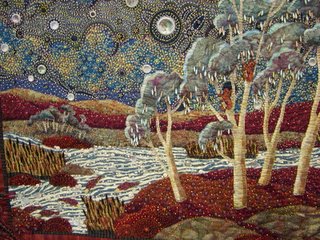 My favorite - Australian Dreamscape by Thom Atkins. This is made with lots of beading, and shows the Australian landscape, with platypus', koala bears, gum trees, and a wonderful river.
My favorite - Australian Dreamscape by Thom Atkins. This is made with lots of beading, and shows the Australian landscape, with platypus', koala bears, gum trees, and a wonderful river.
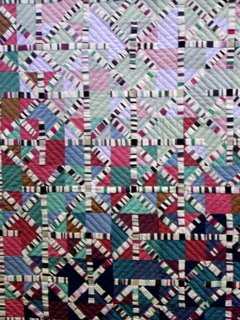
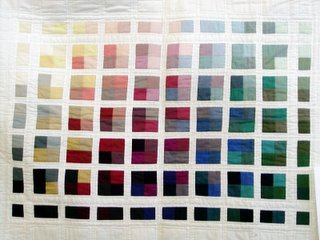
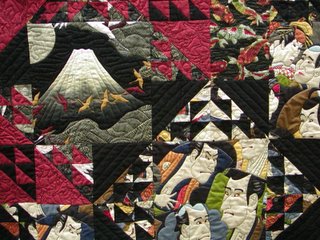
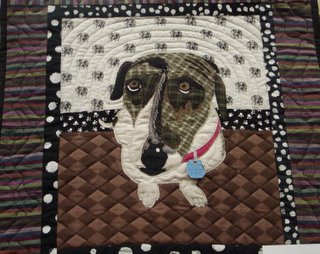
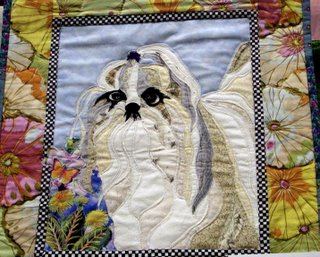
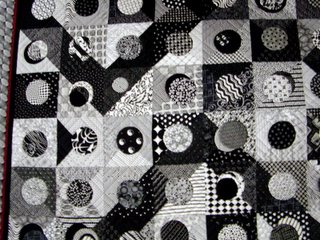
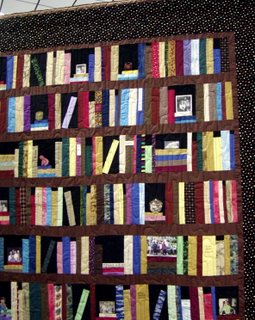 Loved this bookcase, (My Bookshelf, by Dotty Newick) a quilt with titles embroidered on the books, photos on the shelves.
Loved this bookcase, (My Bookshelf, by Dotty Newick) a quilt with titles embroidered on the books, photos on the shelves.
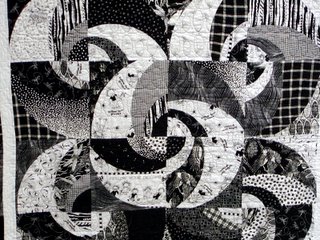
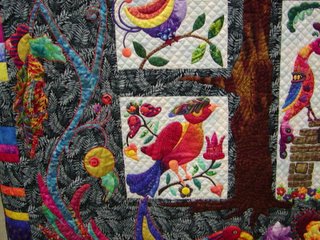
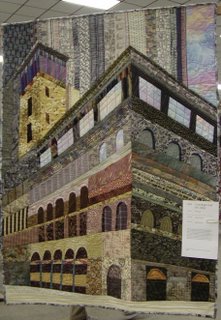 Another favorite (above), a quilt of Carnegie Hall made by Linda Murphy, to commerate her daughter winning a poetry competition and being selected to read her poems at Carnegie Hall.
Another favorite (above), a quilt of Carnegie Hall made by Linda Murphy, to commerate her daughter winning a poetry competition and being selected to read her poems at Carnegie Hall.
 My favorite - Australian Dreamscape by Thom Atkins. This is made with lots of beading, and shows the Australian landscape, with platypus', koala bears, gum trees, and a wonderful river.
My favorite - Australian Dreamscape by Thom Atkins. This is made with lots of beading, and shows the Australian landscape, with platypus', koala bears, gum trees, and a wonderful river.





 Loved this bookcase, (My Bookshelf, by Dotty Newick) a quilt with titles embroidered on the books, photos on the shelves.
Loved this bookcase, (My Bookshelf, by Dotty Newick) a quilt with titles embroidered on the books, photos on the shelves.

 Another favorite (above), a quilt of Carnegie Hall made by Linda Murphy, to commerate her daughter winning a poetry competition and being selected to read her poems at Carnegie Hall.
Another favorite (above), a quilt of Carnegie Hall made by Linda Murphy, to commerate her daughter winning a poetry competition and being selected to read her poems at Carnegie Hall.Saturday, February 25, 2006
Painting My Addiction
 For the last few days I've been making another painting for my class. It's all about one of my favorite addictions, dark chocolate. It was strange, while painting these they became just objects with light, shadow, tones, colors, etc. They completely lost their magic as chocolate, and all week none of them even had a surreptitious bite taken! I wouldn't have thought it possible.....but painting and drawing put me into such an altered state that even chocolate loses its sway for awhile.
For the last few days I've been making another painting for my class. It's all about one of my favorite addictions, dark chocolate. It was strange, while painting these they became just objects with light, shadow, tones, colors, etc. They completely lost their magic as chocolate, and all week none of them even had a surreptitious bite taken! I wouldn't have thought it possible.....but painting and drawing put me into such an altered state that even chocolate loses its sway for awhile.
Thursday, February 23, 2006
Gung Hai Fat Choi, and Woof Woof
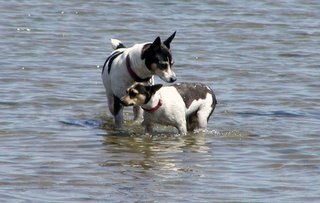 I just received this (unattributed) email and thought it was quite delightful. I made a few editorial comments (in italics!) Wishing you all a prosperous New Year! Happy Chinese New Year!! Gung Hai Fat Choi!! Customs for Chinese New Year include paying off debts, buying new clothes, cleaning the house, and enjoying delicious family feasts. Children receive red envelopes filled with money. Firecrackers are set off to scare aware evil spirits and bring good luck.
I just received this (unattributed) email and thought it was quite delightful. I made a few editorial comments (in italics!) Wishing you all a prosperous New Year! Happy Chinese New Year!! Gung Hai Fat Choi!! Customs for Chinese New Year include paying off debts, buying new clothes, cleaning the house, and enjoying delicious family feasts. Children receive red envelopes filled with money. Firecrackers are set off to scare aware evil spirits and bring good luck.The Year Of The Dog
Guidance For Chinese New Year According to the Chinese calendar and zodiac, January 29, 2006 brings us the Year of the Dog. This means that we have the helpful energy of this loyal companion to accomplish much good in the world and in our lives this year. When we think about dogs, we think of their steadfast love, loyalty, friendly companionship, and forgiving nature. Dogs are playful, but work hard and rest well. They create balance in their lives. We no longer need to be envious of a dog's life, because we can incorporate these qualities to our lives this year.
Dog energy emphasizes the defense of our deepest loyalties with honesty and integrity. Dogs thrive in the security of a healthy, happy home. They value personal happiness and comfort more than material wealth. We may want to envision the world's leaders being guided by the values inherent in dog energy. We can also choose thisyear as a time to focus on what's important in our lives and apply a dog's steady efforts to lovingly protect it.
To the Chinese, dogs symbolize justice and equality. We too can utilize this spirit to bark at injustice, right any wrongs, and restore order. Since dogs also enjoy helping people, this can be a good year for humanitarian efforts and the group consciousness energy needed for rallies and protests. Canine qualities like warmth, empathy, and genuine interest in others is beneficial in most situations. The Chinese calendar includes a five-year cycle of elements, and fire is the
element for 2006. This means that this year's dog energy is lit by the fire to get things accomplished. The Year of the Dog takes places every twelve years. With a dog's forthright honesty and true moral integrity to guide this burning enthusiasm, we can look forward to a
truly great year ahead (if only.....listen up, you world leaders!).
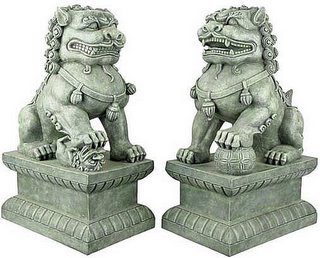
Wednesday, February 22, 2006
In My Mother's Closet
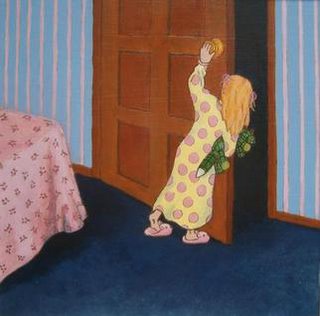 I remember brushing my small girl's face
I remember brushing my small girl's faceagainst creamy silks, fur and velvet,
smelling perfume lingering on
a gown of blue satin with silver stars.
I remember thin-strapped shoes,
a sequinned purse glittering in the shadows.
Immersed in the archaeology of romance
in my mother’s closet.
I remember watching her in cotton dress,
sagging shoes, snapping green beans,
making jam, pushing back her hair,
stirring pots - a tired farm wife, mother of four.
This mother that I knew - had she really
danced in perfumed silk?
Did she grieve for those days
of glamour and freedom?
Did she, like me, secretly come
to the dark sweetness at
the back of her closet, press her face
into silken folds, inhale memories?
Another women shared our home
and our mother.
I always knew that what they had
was the best. The electric glance,
the laughter when, doubled over,
tears streaming down cheeks,
they gave each other that look.
Sharing kitchen chores, gossiping,
mothering four children,
trips to the lake or the beach,
friends for life.
Between, or on the side,
one man, my father, oblivious, peaceful,
going about his chores.
Or did he know?
Had he glimpsed the big love
hidden in my mother’s closet?
Painting by Jennifer Luthi
Monday, February 20, 2006
Anne Sliker - The Third Adult in our Family
 As I mentioned in an earlier post about my mother, her close friend Anne Sliker was a fellow teacher at Wharton High School in New Jersey. Anne and my mother, Alice, shared an apartment for 10 years, until 1942 when my mother and father met. Anne and Alice travelled around the US together, and shared common interests - sports, mutual friends, their teaching community. Here they are together in 1934 at the beach, with my mother's Uncle Nathan in the middle.
As I mentioned in an earlier post about my mother, her close friend Anne Sliker was a fellow teacher at Wharton High School in New Jersey. Anne and my mother, Alice, shared an apartment for 10 years, until 1942 when my mother and father met. Anne and Alice travelled around the US together, and shared common interests - sports, mutual friends, their teaching community. Here they are together in 1934 at the beach, with my mother's Uncle Nathan in the middle. Anne was a Physical Education teacher and a great athelete. She played tennis, rode horseback, excelled at archery, did both cross-country and downhill skiing, swam, and generally was eager for adventure. She also was an amazingly practical person. She had great common sense and wisdom. She could build things, fix things, and make things. Nothing seemed to daunt her. When my parents married in 1942, they asked Anne to move in with them on the farm they bought in Califon, New Jersey (which was, incidentally, Anne's home town). Anne brought her horses, and joined our family in a relationship that lasted for the next 25 years as the third adult in our home.
Anne was a Physical Education teacher and a great athelete. She played tennis, rode horseback, excelled at archery, did both cross-country and downhill skiing, swam, and generally was eager for adventure. She also was an amazingly practical person. She had great common sense and wisdom. She could build things, fix things, and make things. Nothing seemed to daunt her. When my parents married in 1942, they asked Anne to move in with them on the farm they bought in Califon, New Jersey (which was, incidentally, Anne's home town). Anne brought her horses, and joined our family in a relationship that lasted for the next 25 years as the third adult in our home. 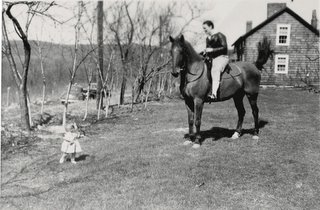 In the photo above, Anne is riding her horse at the Allamuchy home where my parents lived for the first year of their marriage. The little girl in the foreground is me. Anne fit in as comfortably as could be, and I can't recall a time when her presence was an issue between my parents. She and my father respected each other and often helped each other with farm tasks. Her presence was always a joy for us children, even when she threatened to smack us with her "big, flat hand" - I can't remember her ever actually hitting us.
In the photo above, Anne is riding her horse at the Allamuchy home where my parents lived for the first year of their marriage. The little girl in the foreground is me. Anne fit in as comfortably as could be, and I can't recall a time when her presence was an issue between my parents. She and my father respected each other and often helped each other with farm tasks. Her presence was always a joy for us children, even when she threatened to smack us with her "big, flat hand" - I can't remember her ever actually hitting us.Early on, Anne began to work at the Califon Post Office, a job she held until retirement. I remember times on snowy winter days when driving was bad, snow plows had not yet come through, and so Anne would set off to work on foot, a distance of a couple of miles. Sometimes she used skis or snowshoes, and sometimes she just walked across the fields, through the snow. She was tough. This photo is of her in 1954 with our dog, Spike.
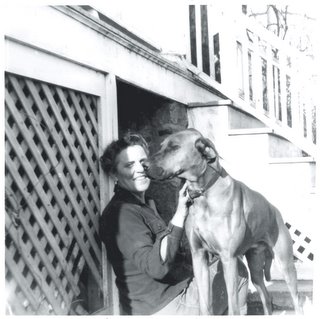 She was the family gardener, and for years cultivated two large (100' long) gardens on the farm. She grew corn, tomatoes, peas, strawberries, squash, string beans, asparagus, and many other items which we ate or froze for later. She also was an amazingly skilled driver. Nothing pleased her more than a road trip, and we had many of them. She never had a dent or a scratch on her Buick, and she drove agressively and with verve. There were memorable trips with Anne (and sometimes my mother) through the New England states, Canada, to Washington DC, and for my brothers, to California.
She was the family gardener, and for years cultivated two large (100' long) gardens on the farm. She grew corn, tomatoes, peas, strawberries, squash, string beans, asparagus, and many other items which we ate or froze for later. She also was an amazingly skilled driver. Nothing pleased her more than a road trip, and we had many of them. She never had a dent or a scratch on her Buick, and she drove agressively and with verve. There were memorable trips with Anne (and sometimes my mother) through the New England states, Canada, to Washington DC, and for my brothers, to California. 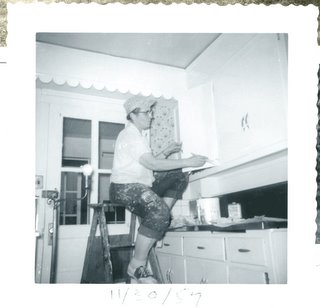 In the photo above, Anne is painting our kitchen cabinets, up on a ladder. Anne and my mother often cooked together, especially before company was coming. I still can see them sitting together in the kitchen snapping beans or hulling strawberries late in the evening, giggling like a couple of kids over some private joke. Some of Anne's specialties were apple dumplings, watermelon pickles, and what she called "graveyard stew" - a piece of buttered toast topped with an egg poached in warm milk. This was always produced when we were sick.
In the photo above, Anne is painting our kitchen cabinets, up on a ladder. Anne and my mother often cooked together, especially before company was coming. I still can see them sitting together in the kitchen snapping beans or hulling strawberries late in the evening, giggling like a couple of kids over some private joke. Some of Anne's specialties were apple dumplings, watermelon pickles, and what she called "graveyard stew" - a piece of buttered toast topped with an egg poached in warm milk. This was always produced when we were sick.Anne never married and only had one brief brush with dating a man during all the years she lived with us. Now that I can look back, it was obvious that she was a lesbian and that she loved our mother. She dressed in men's clothing, cut her hair like a man, taught PE, played lots of sports, was thoroughly butch in every way. Duh!
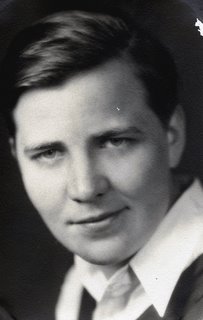 But during most of her lifetime, there was no language or context for her, no way to be herself, no possibility of talking about who she really was. I know that she and my mother had a lifelong, deep emotional attachment. There is no way to know if they were ever physically lovers during all the years they lived together, but I know for certain that they both knew about the love they had. Here they are together, shopping, in the early 1960's.
But during most of her lifetime, there was no language or context for her, no way to be herself, no possibility of talking about who she really was. I know that she and my mother had a lifelong, deep emotional attachment. There is no way to know if they were ever physically lovers during all the years they lived together, but I know for certain that they both knew about the love they had. Here they are together, shopping, in the early 1960's.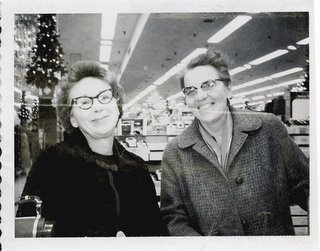 For me, Anne was the single most important person in my life in the years of growing up. In fact, she and I shared a room for most of my childhood. When I had nightmares, I would run across the room and jump into her bed. She would ask me "do you want to be snug like a bunny?", and then she would cuddle me so tenderly. Although she was not an especially demonstrative person, she was able to love me 100%, unconditionally, unlike my mother who was in a constant critique mode around me. Anne supported everything I tried, everything I cared about. She was the one who taught me about all the important transitions in life. She stood beside me through some hard times, and she never gave up on me for one minute. She paid for music lessons, and numerous other little extras for me and my brothers. I named my first born child, Annie, for her. This photo shows Anne meeting Annie for the first time.
For me, Anne was the single most important person in my life in the years of growing up. In fact, she and I shared a room for most of my childhood. When I had nightmares, I would run across the room and jump into her bed. She would ask me "do you want to be snug like a bunny?", and then she would cuddle me so tenderly. Although she was not an especially demonstrative person, she was able to love me 100%, unconditionally, unlike my mother who was in a constant critique mode around me. Anne supported everything I tried, everything I cared about. She was the one who taught me about all the important transitions in life. She stood beside me through some hard times, and she never gave up on me for one minute. She paid for music lessons, and numerous other little extras for me and my brothers. I named my first born child, Annie, for her. This photo shows Anne meeting Annie for the first time. 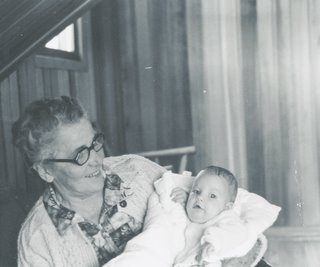 The year before she died, we celebrated her 90th birthday with a grand party. I miss her every day - her goodness, her down-to-earth, salt-of-the-earth sweetness, her gentle gruffness- all of it. I'd give a lot to just hug her one more time. I loved her so, so, so much.
The year before she died, we celebrated her 90th birthday with a grand party. I miss her every day - her goodness, her down-to-earth, salt-of-the-earth sweetness, her gentle gruffness- all of it. I'd give a lot to just hug her one more time. I loved her so, so, so much.
Saturday, February 18, 2006
Mornings At Leisure, a New Luxury!
 Well, I've been painting for many hours, and here is the finished product. The composition changed somewhat, but the idea is the same. These are the things that make my mornings so pleasant: chai, a chocolate "crimpy" from Kelly's, crossword puzzles, reading, walking the dog, maybe a little gardening, leisure time! No more racing out the door to a job - what a wonderful luxury! And now, time to paint too..... aaaaaaah, lucky me!
Well, I've been painting for many hours, and here is the finished product. The composition changed somewhat, but the idea is the same. These are the things that make my mornings so pleasant: chai, a chocolate "crimpy" from Kelly's, crossword puzzles, reading, walking the dog, maybe a little gardening, leisure time! No more racing out the door to a job - what a wonderful luxury! And now, time to paint too..... aaaaaaah, lucky me!
Thursday, February 16, 2006
Balancing Between Encyclopedic and Simplistic

I've been working on an assignment for my beginning painting class. The subject is to paint an "autobiographical still life", using objects to represent something about yourself. This is the third time I've had this kind of assignment in art classes. The first time I made a hand-made artist's book that had pages of references to all the things I care about, from my children to poety to chocolate, and so much more. It was huge! The second time, in a drawing class, I made a drawing where I again stretched to encompass as much as possible about "who I am". For the last few days I've been struggling with making a new composition for a painting. At first I started out again trying to represent all aspects of myself - my family background, children, partner, dogs, reading habits, hobbies, favorite places in the world, etc. The composition was ugly and cluttered and lacked anything unifying. I sulked and moved things around and did dozens of sketches. Nothing worked.
This morning I was walking our dog and I had a revealing moment. I tend to approach everything as if I am an encyclopedia, not wanting to leave anything out that might be crucial or relevant. I think that I also fear being viewed as too simplistic, although I greatly admire artists who can work on one clear and simple idea and make it elegant. I realized what an impediment my encyclopedic nature is to any effort to make art. What I need to learn most as an artist, and perhaps in my life, is to simplify.
Now I'm working on what, for me, is a much simpler idea. It will be a painting representing my leisurely mornings. It will have a New Yorker magazine, a crossword puzzle, a cup of chai, a muffin, a calla lily, and a dog collar. These items represent my typical morning in my (newly) retired life, something I treasure so much! The photo shows the set-up, minus the muffin which may be added when I get started - or maybe I'll just eat it! When I get the painting further along, I'll post it too!
Wednesday, February 15, 2006
Books? No Thanks....
I saw this today in a couple of other blogs: Pharyngula and I Cite. It is quite depressing, and also helps to explain why our country is in such a big mess. I don't imagine that the statistics for reading a newspaper or magazine are much better.....
58% of the US adult population never reads another book after high school.
42% of college graduates never read another book.
80% of US families did not buy or read a book last year.
70% of US adults have not been in a bookstore in the last five years.
Here's where I'm so happy to be a rip-roaring member of the minority. Right now I'm enjoying Terry Gross' wonderful book of interviews from her NPR radio show, Fresh Air. The book is All I Did Was Ask. It is fabulous! Life without books, for me, would be absolute torture. Time to go read now.......
Sunday, February 12, 2006
The Ones that Got Away
We had a conversation today at lunch about things we didn't buy when we were sorely tempted, and how the memory of those things lingers years later. In my case there were two items I've always wished I had pursued. The first was a Japanese netsuke cat, beautifully carved in ivory, and curled into a sleeping posture. I saw it in London in about 1969 or 1970, in a shop window. For some reason it screamed out to me. I had just left my two beloved cats behind in Santa Cruz and come to live in Europe, and I was missing them terribly. But we were fairly broke, and the netsuke cat was somewhat expensive, and so I didn't pursue it - but I still think of how it looked in that window, and how it would have been to own it. I've never seen one like it since. Grrrrrrrrrr......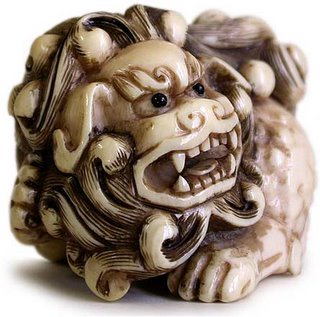 The other item was a dress. It must have been around 1968. My parents were having their first holiday party in their fancy new home in Maryland. I had flown in from my hippie life in California to spend some time with my parents. Nothing I had brought with me was good enough to wear to the coming party, according to my mother. She decided it would be a good excuse for the two of us to go to New York on a shopping expedition, and she offered to buy me something suitable to wear. What followed was an excruciating day in some of the big New York department stores, where she tried to get me to look like she wanted me to look (plaid gingham satin gathered long skirt - ick!). Finally I found a dress that I loved. It was a long, pale pink knitted sweater dress, with an A-line skirt to the floor, long sleeves, and a high collar. Knitted into the fabric was an overall pattern of white animals in silhouette. It fit me beautifully and the pink was great with my blonde hair and light complexion. I thought the dress looked terrific on me, and that it would have been great for her party. My Mom saw it differently and flatly refused to let me get it. We had a huge fight over it, and I ended up getting nothing at all. But I've always thought about that dress, how perfect it was, and how sad that I had to leave it there.
The other item was a dress. It must have been around 1968. My parents were having their first holiday party in their fancy new home in Maryland. I had flown in from my hippie life in California to spend some time with my parents. Nothing I had brought with me was good enough to wear to the coming party, according to my mother. She decided it would be a good excuse for the two of us to go to New York on a shopping expedition, and she offered to buy me something suitable to wear. What followed was an excruciating day in some of the big New York department stores, where she tried to get me to look like she wanted me to look (plaid gingham satin gathered long skirt - ick!). Finally I found a dress that I loved. It was a long, pale pink knitted sweater dress, with an A-line skirt to the floor, long sleeves, and a high collar. Knitted into the fabric was an overall pattern of white animals in silhouette. It fit me beautifully and the pink was great with my blonde hair and light complexion. I thought the dress looked terrific on me, and that it would have been great for her party. My Mom saw it differently and flatly refused to let me get it. We had a huge fight over it, and I ended up getting nothing at all. But I've always thought about that dress, how perfect it was, and how sad that I had to leave it there.
Does anybody else have memories of things they didn't pursue in the past that still live with them today?
 The other item was a dress. It must have been around 1968. My parents were having their first holiday party in their fancy new home in Maryland. I had flown in from my hippie life in California to spend some time with my parents. Nothing I had brought with me was good enough to wear to the coming party, according to my mother. She decided it would be a good excuse for the two of us to go to New York on a shopping expedition, and she offered to buy me something suitable to wear. What followed was an excruciating day in some of the big New York department stores, where she tried to get me to look like she wanted me to look (plaid gingham satin gathered long skirt - ick!). Finally I found a dress that I loved. It was a long, pale pink knitted sweater dress, with an A-line skirt to the floor, long sleeves, and a high collar. Knitted into the fabric was an overall pattern of white animals in silhouette. It fit me beautifully and the pink was great with my blonde hair and light complexion. I thought the dress looked terrific on me, and that it would have been great for her party. My Mom saw it differently and flatly refused to let me get it. We had a huge fight over it, and I ended up getting nothing at all. But I've always thought about that dress, how perfect it was, and how sad that I had to leave it there.
The other item was a dress. It must have been around 1968. My parents were having their first holiday party in their fancy new home in Maryland. I had flown in from my hippie life in California to spend some time with my parents. Nothing I had brought with me was good enough to wear to the coming party, according to my mother. She decided it would be a good excuse for the two of us to go to New York on a shopping expedition, and she offered to buy me something suitable to wear. What followed was an excruciating day in some of the big New York department stores, where she tried to get me to look like she wanted me to look (plaid gingham satin gathered long skirt - ick!). Finally I found a dress that I loved. It was a long, pale pink knitted sweater dress, with an A-line skirt to the floor, long sleeves, and a high collar. Knitted into the fabric was an overall pattern of white animals in silhouette. It fit me beautifully and the pink was great with my blonde hair and light complexion. I thought the dress looked terrific on me, and that it would have been great for her party. My Mom saw it differently and flatly refused to let me get it. We had a huge fight over it, and I ended up getting nothing at all. But I've always thought about that dress, how perfect it was, and how sad that I had to leave it there.Does anybody else have memories of things they didn't pursue in the past that still live with them today?
Saturday, February 11, 2006
Knocked Our Socks Off!
 Last night we had our socks knocked off at a powerful Bonnie Raitt concert at the sold-out Santa Cruz Civic Auditorium. Bonnie just keeps getting better and better. The performance was a musical feast, with both old favorites and new songs performed to perfection. As a special treat, Bonnie's old friend Linda Tillery took the stage with her for a few songs together,
Last night we had our socks knocked off at a powerful Bonnie Raitt concert at the sold-out Santa Cruz Civic Auditorium. Bonnie just keeps getting better and better. The performance was a musical feast, with both old favorites and new songs performed to perfection. As a special treat, Bonnie's old friend Linda Tillery took the stage with her for a few songs together,  and the two huge voices filled the Civic with liquid honey, and goosebump-producing harmonies. Bonny Raitt was funny, intimate, and exciting to watch. We woke up this morning saying to each other "don't we live in the best town??!!"
and the two huge voices filled the Civic with liquid honey, and goosebump-producing harmonies. Bonny Raitt was funny, intimate, and exciting to watch. We woke up this morning saying to each other "don't we live in the best town??!!"
And Then There Was My Dad
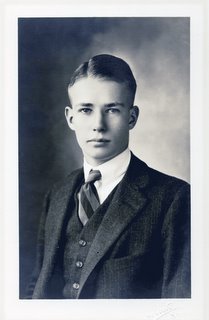 Ever since I started thinking about how to describe my Dad, Thomas Andrews Howell II, I've been dreaming about him several times a week. I've found him in unusual situations - sleeping on a raft floating down a rapid stream, hiding in a tree full of huge flowers, giving a speech at an amusement park, where nobody is listening. He was, in some ways, an elusive guy. Even though he has been gone for more than 20 years, I still find myself searching for him in my memory and in my dreams.
Ever since I started thinking about how to describe my Dad, Thomas Andrews Howell II, I've been dreaming about him several times a week. I've found him in unusual situations - sleeping on a raft floating down a rapid stream, hiding in a tree full of huge flowers, giving a speech at an amusement park, where nobody is listening. He was, in some ways, an elusive guy. Even though he has been gone for more than 20 years, I still find myself searching for him in my memory and in my dreams.Born in 1902, he was the second son in a privileged family. In this photograph, he is the child on the left, with his brothers Hunt and John, and sister Elena.
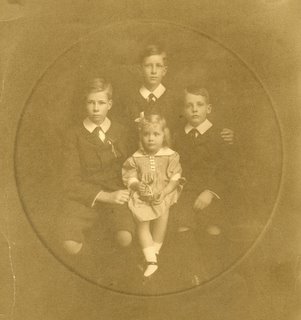 As a young man, my father was sent to prep school, Hotchkiss, and then to Yale University. Here's a photo of him at Yale - he is the one with the top hat, somewhat reminiscent of Jiminy Cricket!
As a young man, my father was sent to prep school, Hotchkiss, and then to Yale University. Here's a photo of him at Yale - he is the one with the top hat, somewhat reminiscent of Jiminy Cricket!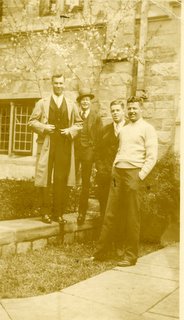 He graduated in 1925, and then apparently took a long trip to Europe to sow some wild oats and get some European culture under his belt. Here is a copy of his French driver's license from this time.
He graduated in 1925, and then apparently took a long trip to Europe to sow some wild oats and get some European culture under his belt. Here is a copy of his French driver's license from this time. The years between 1925 and 1942 are somewhat of a mystery to me. My father did not meet my mother until he was 40, and had apparently been floating about in the high society life of New York, Connecticut, and Long Island during those years. There was a rumor that he had been engaged, for a time, to a member of the Rockefeller family, but he would never talk about that. One thing for certain, he was an early and life-long member of the Angler's Club of New York, and he loved fishing.
The years between 1925 and 1942 are somewhat of a mystery to me. My father did not meet my mother until he was 40, and had apparently been floating about in the high society life of New York, Connecticut, and Long Island during those years. There was a rumor that he had been engaged, for a time, to a member of the Rockefeller family, but he would never talk about that. One thing for certain, he was an early and life-long member of the Angler's Club of New York, and he loved fishing.  He also had some affiliation with the Howell family business, the West Indies Sugar Company, but close to the time of his marriage he broke away from that pursuit and determined to live a simple life in the country. I always admired him for that move, for having the courage of his convictions to forego a life of easy wealth for what would be much more difficult and penurious time on the farm.
He also had some affiliation with the Howell family business, the West Indies Sugar Company, but close to the time of his marriage he broke away from that pursuit and determined to live a simple life in the country. I always admired him for that move, for having the courage of his convictions to forego a life of easy wealth for what would be much more difficult and penurious time on the farm.For a few years, he worked for Clendenin Ryan as an estate manager, and later as a campaign manager when Ryan made an unsuccessful run for a state political office. Eventually his attention turned more and more to life on our farm. He raised sheep and turkeys, plowed fields, baled hay, and put in long hours keeping the place together. Here's a photo of him with our "free range" turkeys. The buildings in the background belonged to our nearest neighbors.
 Throughout our childhood, Dad nearly always had an outside job that he worked at, in addition to the farming. I can remember that he did something about billboards - either selling ads for them, or constructing them. He worked as a surveyor for a few years, and occasionally took me out with him on his jobs. Then for a long time he worked for the US Dept. of Agriculture as a "field agent", basically going around the rural areas of New Jersey cutting deals with farmers about what to grow and what not to grow. On the weekends and evenings, he worked the farm. In the early years, he had a hired man, Theodore Beam, who helped with everything. I think that our father was the epitome of the "country gentleman".
Throughout our childhood, Dad nearly always had an outside job that he worked at, in addition to the farming. I can remember that he did something about billboards - either selling ads for them, or constructing them. He worked as a surveyor for a few years, and occasionally took me out with him on his jobs. Then for a long time he worked for the US Dept. of Agriculture as a "field agent", basically going around the rural areas of New Jersey cutting deals with farmers about what to grow and what not to grow. On the weekends and evenings, he worked the farm. In the early years, he had a hired man, Theodore Beam, who helped with everything. I think that our father was the epitome of the "country gentleman".As a father, our Dad was notably present in some ways, and notably absent in others. He was especially good at connecting us with nature. He was an ardent naturalist and loved studying natural history, and being outdoors in nature. He loved fishing, hunting, bird watching, boats. He taught us all to shoot, and fish. Every year, he took time off to take us children to the American Museum of Natural History in New York, one of the few places he showed a strong interest in going with us. He also took us on occasional hikes in the woods behind our farm. He had a fantastic collection of books - including a number of rare and valuable books. I remember him reading to us from them, sometimes, and how we children spent hours poring over his old engravings of ships, his Ashley Book of Knots, his Moby Dick with the wonderful Rockwell Kent illustrations. This photo shows Dad in his library, with my brothers Tom and Hunt.
 Dad was the person in the family who administered spankings (with his belt), and who occasionally would reach across the family dinner table to smack one of us rude children on top of the head with a large spoon (ouch!). Yet I remember him most as the family peacemaker. He tried so hard to mediate between all of us, to cool tempers, urge patience, plead for gentleness and consideration. During our teenage years, it seemed that wars with our mother raged on, and Dad was always in the middle trying to make peace. He was frequently moved to tears of frustration and sadness - in fact, he cried often in our childhood, and later every time one of my visits to them ended, he wept openly. There was no question about how much he loved all of us.
Dad was the person in the family who administered spankings (with his belt), and who occasionally would reach across the family dinner table to smack one of us rude children on top of the head with a large spoon (ouch!). Yet I remember him most as the family peacemaker. He tried so hard to mediate between all of us, to cool tempers, urge patience, plead for gentleness and consideration. During our teenage years, it seemed that wars with our mother raged on, and Dad was always in the middle trying to make peace. He was frequently moved to tears of frustration and sadness - in fact, he cried often in our childhood, and later every time one of my visits to them ended, he wept openly. There was no question about how much he loved all of us.On the other hand, he had an emotional reserve and distance. He did not like to talk about his past. He preferred to have no waves in our household. He was affectionate but in a distant kind of way.
He had not interest whatsoever in music, and occasionally made fun of it. Sometimes he would be inspired to recite a few lines of what he said was the only song he knew, "Who Threw the Overalls in Mrs. Murphy's Chowder". This performance was done with sarcasm and disdain. I don't know how it happened that at least one of his sons, and several of his grandchildren, turned out to have great musical ability.
I have so many memories of life on that farm. Dad had a butcher shop, with a large walk-in chill room, where he slaughtered turkeys and lambs. This was somewhat of a seasonal occcupation, and he had some regular customers. His close friend, Norman B. Woolworth (referred to as "Uncle Woolie", although we almost never saw him) regularly ordered 100 dressed turkeys at both Thanksgiving and Christmas. The story was that he gave each of the crew members of his yacht a bird on these holidays. At Easter time, it was the lambs' turn to go, and Dad sold butchered lambs to some local Greek customers (Mr. Sappatoros), as well as driving them to the markets in New York City. We kids used to get up and go along on some of those very early morning jaunts.
One year our dog, Spike (a boxer, great-dane cross) died during a hard, cold winter. The ground was frozen and Dad decided to wait until Spring to bury Spike. He curled him into a sleeping posture and put him on a high shelf inside the chill room, where he stayed frozen solid for several months. I remember vividly how my brothers and I would sneak into the chill room and look at our dog sleeping up on the shelf. We knew he was dead, but he looked as if he might wake up any minute.
Death, on our farm, was a very natural part of events, whether it came accidentally or because it was time to be slaughtered. We had a "dead animal man" who came when large animals died, and would haul away the carcasses in his truck. Dad always told us that the animals were melted down to make soap. Between having my mother wash my mouth out with soap, and my Dad telling us that soap was made from dead animals, I became something of a soap-a-phobic, and never enjoyed using soap until much later in life!
Dad belonged to the local Civil Defense unit in our area. It meant that he had a uniform shirt, a helmet, and a badge and several accoutrements such as a whistle and a "billy club". Mostly this unit was called out to help with flooding and big storms, such as the hurricane in 1955 when Hurricane's Connie and then Diane flooded the Delaware River. But there was other, more ominous Civil Defense work during the 1950's, the time of the McCarthy purges. In our county (Hunterdon) lived many artists and intellectuals who also were suspected members of the communist party. One evening my father got into his full Civil Defense regalia and we noticed that our mother was more agitated than usual, fussing over him and telling him to be careful. The next day, the local paper reported that a group of "unknown" people had broken into a building where a small communist newsletter was printed, and the presses were all smashed to smithereens. Again, Dad would not talk about this, but I'm sure that he and his Civil Defense team were the smashers.
On other occasions, our Dad would have conflicts with the Samski family who lived at the end of our long lane (see the photo above with the turkeys). Mr. Samski was an ex-prizefighter, and his place bordered our property. Samski kept some mean dogs, had a bunch of for-rent horses, and sometimes let his junk fall over onto my father's fields. I can remember a few times when my father took a shotgun and went off down the lane to have a "conversation" with Samski about cleaning up his mess. No shots were ever exchanged, but the threat was definitely out there, and there was a frisson of hostility between our property and theirs. We were always warned not to talk to the Samski's and never to linger near their place, even though one of their children was our age.
I can only remember going on one vacation with our father, a long weekend on his brother Hunt's yacht in Long Island Sound. Otherwise, Dad seemed to always stay home and mind the farm. We went on many trips with our mother and Anne Sliker, but Dad did not come along.
Dad kept an "office" in the basement of our house where he would go to "work on the books". It was here that he paid bills, and kept records of all his sheep and turkeys - including inventories of births, sales, dates the sheep were dipped, etc. He spent hours down there poring over his paperwork. When he finally came upstairs, he would generally fall asleep on the couch in front of the TV, and snore lightly. Eventually he would wake up, shake his head with a huge grin, and say "I was just resting my eyes."
I remember the nights of my childhood punctuated by the sound of gunfire. A couple of times a year, we would be jolted from sleep when my Dad heard the sheep bells ringing, and knew that wild dogs were in the fields near the herds. He simply raised their bedroom window and fired his shotgun into the night to scare off the dogs. We became used to this, and could go right back to sleep after such awakenings!
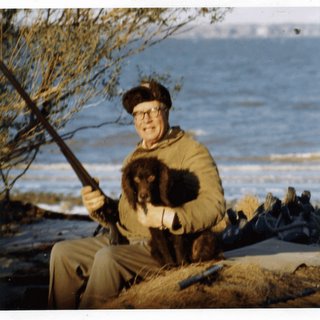 Because of the years he lived in the Dominican Republic, Dad spoke fluent Spanish. But he rarely had a chance to use it. He did, however, surprise me one time when a young man from Puerto Rico (whom I had met on a bus to New York) tried to follow up and see me again. My father told this poor young gentleman, in what sounded like blistering Spanish, to stay away from his daughter and never make contact again. That was humiliating.....
Because of the years he lived in the Dominican Republic, Dad spoke fluent Spanish. But he rarely had a chance to use it. He did, however, surprise me one time when a young man from Puerto Rico (whom I had met on a bus to New York) tried to follow up and see me again. My father told this poor young gentleman, in what sounded like blistering Spanish, to stay away from his daughter and never make contact again. That was humiliating.....Dad worked so hard for many years, and always seemed to struggle to make ends meet. He saw his family members occasionally, but we children never felt close to them (except for our grandmothers). Eventually, in the early 60's, my parents retired, sold the farm, and bought a home on the Eastern Shore of Maryland, outside Cambridge. To my Dad's delight, this place had quite a bit of waterfront on the Choptank River. He had a small wooden dory built for himself, and settled into an extremely happy life of puttering around on the water, harvesting oysters, fishing, and entertaining with my mother. Here he is out on the Choptank first with his grandson, Hunt Jr., and in the second photo with my twin brothers, Hunt and Dick.
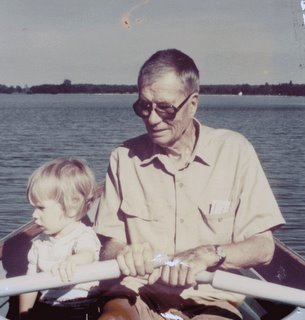
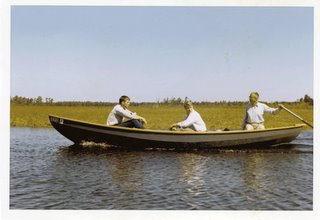
He was fond of his grandchildren, and never happier than when the whole family was together. We had a huge celebration for his 80th birthday. He died in 1985, after a long and debilitating illness. He and my mother were happily married for 43 years.
Tuesday, February 07, 2006
What's Up?
Yeah, I know. This blog is getting stale! Here's where I've been for a few days.
1. Out in the garden, enjoying the sunny days. I put in gravel walkways behind my new solar fountain, planted a bunch of flowers for color, and put a bark/mulch on all the exposed dirt. Now I'm working on pulling up weeds in my so-called "lawn", which is itself a weed haven, not much more. But I'm on my way to a better looking back yard. Yahoo!!
2. Having a party. It was Daniella's birthday, so we had a "Clashing Patterns and Pie Potluck", a repeat of a party we had about 10 years ago that was a big hit. This year about 50 guests arrived, dressed in the most clashing outfits they could put together. Everyone brought either a sweet or a savory pie, and food was great. My niece, Amy, from New Hampshire flew out for the weekend - the best treat of all! Daniella posted several photos from the party on her blog. Here she is, in her clashing outfit, out in the back yard with the red dot fountain.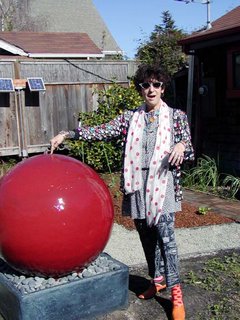 3. Back to School. Last night was my first class for the spring semester at Cabrillo College. I'm taking life drawing and beginning painting (starts this morning). I'm as excited as a little kid about these classes. The life drawing class, taught by Noah Buchanan, will be based on studying a lot of anatomy and classical art, with a nude model in almost every class - I'm sure I'm going to love every minute. My painting class will be taught by Tobin Keller, who was my teacher last spring when I studied Color and Design. I already know he is terrific.
3. Back to School. Last night was my first class for the spring semester at Cabrillo College. I'm taking life drawing and beginning painting (starts this morning). I'm as excited as a little kid about these classes. The life drawing class, taught by Noah Buchanan, will be based on studying a lot of anatomy and classical art, with a nude model in almost every class - I'm sure I'm going to love every minute. My painting class will be taught by Tobin Keller, who was my teacher last spring when I studied Color and Design. I already know he is terrific.
4. Spending time with our little Zuma. She has definitely been impacted by the death of our older dog, Lola, so we're trying to give her extra attention, lots of walks, hugs, and spoiling. Here she is this morning, snoozing on the back of the couch.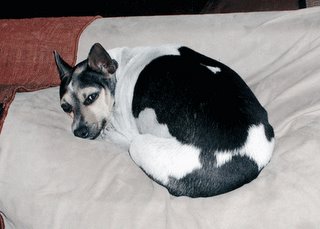 This past week hasn't left a lot of time for blogging!
This past week hasn't left a lot of time for blogging!
1. Out in the garden, enjoying the sunny days. I put in gravel walkways behind my new solar fountain, planted a bunch of flowers for color, and put a bark/mulch on all the exposed dirt. Now I'm working on pulling up weeds in my so-called "lawn", which is itself a weed haven, not much more. But I'm on my way to a better looking back yard. Yahoo!!
2. Having a party. It was Daniella's birthday, so we had a "Clashing Patterns and Pie Potluck", a repeat of a party we had about 10 years ago that was a big hit. This year about 50 guests arrived, dressed in the most clashing outfits they could put together. Everyone brought either a sweet or a savory pie, and food was great. My niece, Amy, from New Hampshire flew out for the weekend - the best treat of all! Daniella posted several photos from the party on her blog. Here she is, in her clashing outfit, out in the back yard with the red dot fountain.
 3. Back to School. Last night was my first class for the spring semester at Cabrillo College. I'm taking life drawing and beginning painting (starts this morning). I'm as excited as a little kid about these classes. The life drawing class, taught by Noah Buchanan, will be based on studying a lot of anatomy and classical art, with a nude model in almost every class - I'm sure I'm going to love every minute. My painting class will be taught by Tobin Keller, who was my teacher last spring when I studied Color and Design. I already know he is terrific.
3. Back to School. Last night was my first class for the spring semester at Cabrillo College. I'm taking life drawing and beginning painting (starts this morning). I'm as excited as a little kid about these classes. The life drawing class, taught by Noah Buchanan, will be based on studying a lot of anatomy and classical art, with a nude model in almost every class - I'm sure I'm going to love every minute. My painting class will be taught by Tobin Keller, who was my teacher last spring when I studied Color and Design. I already know he is terrific.4. Spending time with our little Zuma. She has definitely been impacted by the death of our older dog, Lola, so we're trying to give her extra attention, lots of walks, hugs, and spoiling. Here she is this morning, snoozing on the back of the couch.
 This past week hasn't left a lot of time for blogging!
This past week hasn't left a lot of time for blogging!
Thursday, February 02, 2006
Memories of My Mother
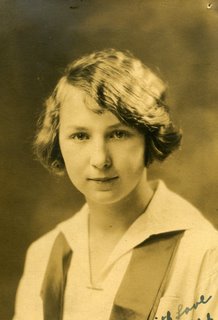 My mother, Alice Whitfield Howell - well, now that could take a book in itself. As I wrote in an earlier post, she was raised in a country store in northern New Jersey, in a family that struggled to make ends meet. There was a strong religious streak in the family (Presbyterian), as her grandfather had been a minister, and her parents both were quite religious. My mother was educated at Stroudsburg State Teachers College in Pennsylvania, and went on to become an English teacher at Wharton High School, near Dover, N.J. For ten years she shared an apartment with her dearest friend, Anne Sliker, who was a physical education teacher at the same school. Those two teachers/pals took trips together, attended each others' family events, and were the closest of friends. I'll write lots more about Anne in an upcoming blog, since she became an integral part of our family. Here's an early photo of Mom on one of those trips with Anne
My mother, Alice Whitfield Howell - well, now that could take a book in itself. As I wrote in an earlier post, she was raised in a country store in northern New Jersey, in a family that struggled to make ends meet. There was a strong religious streak in the family (Presbyterian), as her grandfather had been a minister, and her parents both were quite religious. My mother was educated at Stroudsburg State Teachers College in Pennsylvania, and went on to become an English teacher at Wharton High School, near Dover, N.J. For ten years she shared an apartment with her dearest friend, Anne Sliker, who was a physical education teacher at the same school. Those two teachers/pals took trips together, attended each others' family events, and were the closest of friends. I'll write lots more about Anne in an upcoming blog, since she became an integral part of our family. Here's an early photo of Mom on one of those trips with Anne In 1942, when my mother was 33 years old, she was introduced to my father, Tom, who was already 40 and had never married. What followed was a whirlwind courtship and marriage within a few months. Tom and Alice lived for their first year in Allamuchy, NJ, on the estate of Clendenin J. Ryan, the son of wealthy financier Thomas Fortune Ryan. "Uncle Clen" was a millionaire who hired my father as his estate manager. Already by that time, Dad had decided that living in New York and working in the sugar business was not for him. He was determined to live in the country, and had made a break with the family business. During that first year in Allamuchy, I was born and my parents soon bought a 100 acre farm outside Califon, New Jersey, a beautiful valley with gently rolling hills. The family lived there for the next 25 years.Here is a photo of our family on a Sunday walk in the woods behind our farm.
In 1942, when my mother was 33 years old, she was introduced to my father, Tom, who was already 40 and had never married. What followed was a whirlwind courtship and marriage within a few months. Tom and Alice lived for their first year in Allamuchy, NJ, on the estate of Clendenin J. Ryan, the son of wealthy financier Thomas Fortune Ryan. "Uncle Clen" was a millionaire who hired my father as his estate manager. Already by that time, Dad had decided that living in New York and working in the sugar business was not for him. He was determined to live in the country, and had made a break with the family business. During that first year in Allamuchy, I was born and my parents soon bought a 100 acre farm outside Califon, New Jersey, a beautiful valley with gently rolling hills. The family lived there for the next 25 years.Here is a photo of our family on a Sunday walk in the woods behind our farm. 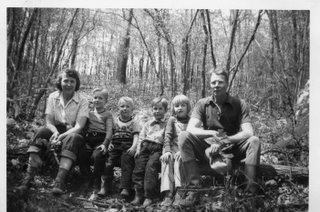 My mother gave up teaching school as soon as she was married. She also gave up driving a car, and she never was employed or drove again. That, I guess, was how they did it back then but it still astounds me when I think of it. The other astounding thing was that my parents invited my mother's c0-teacher/best friend, Anne Sliker, to move in with them at the farm, and she did indeed live with us for the next 25 years - a third adult in our home.
My mother gave up teaching school as soon as she was married. She also gave up driving a car, and she never was employed or drove again. That, I guess, was how they did it back then but it still astounds me when I think of it. The other astounding thing was that my parents invited my mother's c0-teacher/best friend, Anne Sliker, to move in with them at the farm, and she did indeed live with us for the next 25 years - a third adult in our home.My mother was in every way a marvelous farm wife. She cooked, cleaned, baked almost every day, canned and froze food from our gardens and orchards, prided herself on making 100 jars of jam every summer. She kept a beautiful house, and loved to entertain. She loved pretty china and linens, and gorgeous silver. Our flower garden was spectacular, and she grew to love flower arranging . Later in her life, she entered flower shows and belonged to garden clubs. She was gregarious and had many friends in our neighborhood. Our home was frequently the location of huge Whitfield family parties - of course Grandma's birthday every December. But there were picnics, church suppers, Thanksgiving, other birthdays and holidays. She embraced any opportunity to entertain. When she and my dad retired, they did the opposite of most people their age. They bought a 6 bedroom home on the Chesapeake Bay, the "Garden of Eden", on 7 acres of waterfront land, and there the entertaining reached new zeniths.
My mother was strict with us children, and critical. Everything we did or did not do reflected on her. She was a black and white thinker where we were concerned. She was the arbiter of good and bad, and she (and God) would punish us if we strayed over the line towards badness. She took great pride in our achievements (such as good grades) but she also did not hesitate to take a bar of soap and roughly wash our mouths out with it if we sad "hell" or "damn". She monitored what we wore, what we said, who we played with, what we thought, and just about anything else she thought she could control to keep us on the straight and narrow pathway she saw for us. When I was a teenager, she frequently listened in on my phone calls, steamed open my mail, read my journal, examined my underwear, all in the name of keeping me under control. We had many painful confrontations during those years.
I think the dynamic that drove our mother most strongly was her desire to measure up to the family she had married into, and to make us children measure up as well. She drove me crazy with what I called "name dropping", littering her conversations with the names of the wealthy and famous friends of my father's family. She browsed eagerly through the New York Social Register (where our family was listed), and gleaned nuggets of information from it which she used in various ways. She forbade us to play with certain children in the nearby small town who came from poor or uneducated families, and would not allow us to bring home anyone who was "not good enough". I was ashamed and fought her constantly, especially in my teenage years, for what I perceived as her immense snobbishness. I now realize that she was probably scared to death underneath it all that somebody would see her as "less than" and "not good enough" for my father and his family.
In fact, we rarely saw my father's family. Most of our family gatherings were those of the Whitfield side, my mother's family. When we did get together with the Howells, it was a rare occasion. To this day, I don't understand why, except that our lives were so different from theirs. We were a sprawling family with 4 kids, struggling to make it on a farm. They had yachts, servants, money, and commuted to New York from their homes in exclusive suburbs.
My mother lived alone for 10 years after my father died in 1985. She was a great reader, loved to do the crossword puzzle every day in the New York Times. She took long walks and exercised on the floor of her bedroom. Although she was obsessed with weight (hers, mine, and everybody elses), she rarely weighed above 125 pounds - quite trim for someone 5'4" tall. It seemed as if she was on a lifelong diet, and indeed she talked about her weight (and my weight) almost every time I saw her.
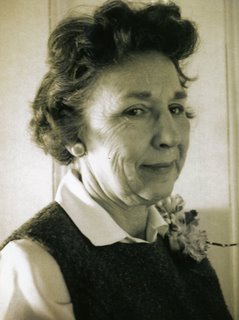 I can't say that I was close to my mother. She was judgmental around me, and critical of my choices and decisions. My teenage pregnancy and abortion (in the late 1950's) certainly made things worse, although the lack of any information I had at that time about sexuality and birth control, played a large part in my dilemma. She was bitterly opposed to my first marriage, and sobbed with rage at my wedding, after screaming at me all the way to the ceremony "I won't allow you to do this. I won't allow you to throw your life away". Over the years, she mellowed somewhat. Since my marriage lasted 16 years and produced three lovely children, she relented enough to be a loving grandmother to them.
I can't say that I was close to my mother. She was judgmental around me, and critical of my choices and decisions. My teenage pregnancy and abortion (in the late 1950's) certainly made things worse, although the lack of any information I had at that time about sexuality and birth control, played a large part in my dilemma. She was bitterly opposed to my first marriage, and sobbed with rage at my wedding, after screaming at me all the way to the ceremony "I won't allow you to do this. I won't allow you to throw your life away". Over the years, she mellowed somewhat. Since my marriage lasted 16 years and produced three lovely children, she relented enough to be a loving grandmother to them.In her last years, she and I made a truce, of sorts. We were able to talk about the hard times, and forgive each other for all the painful years. She died in December 1995, taken away by a stroke in her sleep from which she never regained consciousness. She was 84 years old. I still miss being able to telephone her and have a chat.
Wednesday, February 01, 2006
Do Not Lose Heart
 For several years I've subscribed to a small magazine called Heron Dance. It is filled with exquisite water color paintings of subjects from nature, and writing that is inspiring, thought-provoking, and serene. Two of their illustrations are shown here in this blog. A recent issue had a wonderful long quote from Clarissa Pinkola-Estes, "Do Not Lose Heart". Since the political and environmental situation in the US (and the world) is so horrible these days, it is easy to despair. These words were quite meaningful to me.
For several years I've subscribed to a small magazine called Heron Dance. It is filled with exquisite water color paintings of subjects from nature, and writing that is inspiring, thought-provoking, and serene. Two of their illustrations are shown here in this blog. A recent issue had a wonderful long quote from Clarissa Pinkola-Estes, "Do Not Lose Heart". Since the political and environmental situation in the US (and the world) is so horrible these days, it is easy to despair. These words were quite meaningful to me.Ours is not the task of fixing the entire world all at once, but of stretching out to mend the part of the world that is within our reach. Any small, calm thing that one soul can do to help another soul to assist some portion of this poor suffering world, will help immensely. It is not given to us to know which acts or by whom, will cause the critical mass to tip toward an enduring good. What is needed for dramatic change is an accumulation of acts, adding, adding to, adding more, continuing. We know that it does not take "everyone on Earth" to bring justice and peace, but only a small, determined group who will not give up during the first, second, or hundredth gale.Thanks to those courageous and few journalists who are attempting to shine light on the truth. Thanks to a few brave Senators who stood up against the nomination of Samuel Alito. Thanks to those working for an end to poverty, an end to war, an end to disease. Thanks to fellow bloggers who shine so brilliantly. Thanks to artists of all stripes who reflect their reality for the rest of us. Thanks to children for showing us how simple life could be. Thanks to pets for their unconditional love. Thanks to all of you, in my life, who stand up and shine your light. You keep me going.
One of the most calming and powerful actions you can do to intervene in a stormy world is to stand up and show your soul. Soul on deck shines like gold in dark times. The light of the soul throws sparks, can send up flares, builds signal fires, causes proper matters to catch fire. To display the lantern of soul in shadowy times like these - to be fierce and to show mercy toward others, both, are acts of immense bravery and greatest necessity. Struggling souls catch light from other souls who are fully lit and willing to show it. If you would like help to calm the tumult, this is one of the strongest things you can do.

Subscribe to:
Comments (Atom)

